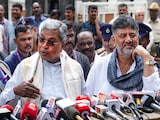From agreeing to triple their investments in renewable energy by 2030 to making efforts to augment funding for climate crisis-induced disasters, there were many key takeaways on the climate front from India's G-20 presidency. Environment Minister Bhupender Yadav speaks to NDTV's Vasudha Venugopal on the most important points.
As the environment minister, what, according to you, is the significance of the decisions taken during India's G20 presidency?
India's G20 Presidency has been a roaring success because of the consensus-driven, decisive leadership of Prime Minister Narendra Modi ji. PM Modi's leadership has not only ensured the heavily divided bloc reaches a consensus but has also laid the ground for deeper global future cooperation. The Delhi Summit has turned out to be a strong reflection of the country's rising stature on the global stage.
There have been several key takeaways from the Summit, each as important as the other. Under India's presidentship, G20 changed forever as it witnessed the inclusion of the African Union. It wasn't an easy task - bridging the gaps between the different factions of the world blocks. PM Modi's stature as a global leader helped India achieve this remarkable feat.
One of the most contentious areas was climate change. Through dedicated efforts from India, a consensus emerged on addressing the climate crisis. The contentious issues on which a consensus has been achieved include climate finance, energy transitions, using and restoring natural ecosystems, harnessing and preserving ocean-based economies, plastic pollution, reducing disaster risk and building resilient infrastructure. This consensus will help build a more sustainable world and ensure economic growth is human-centric.
G20 leaders have also committed to robust collective actions that will enable the world to embrace sustainable production and consumption patterns and mainstream Lifestyles for Sustainable Development. Adopting Mission LiFE, or Lifestyles for Environment, is a clarion call given by PM Modi to the world. Studies show that it could contribute to significant emission reduction by 2030 for a global net zero future. This was one of India's key focus areas during its presidency.
I am also very happy to mention the launch of the Global Biofuels Alliance (GBA) by PM Modi as the Chair's initiative during India's G20 Presidency. This collective collaboration highlights the unified efforts and common purpose towards the development of biofuels. GBA will serve as a catalytic platform, fostering global collaboration for the advancement and widespread adoption of biofuels. Another major takeaway from the Delhi Summit has been the India-Middle East-Europe Economic Corridor, which aims to foster economic integration and connect Asia with Europe.
The Delhi Declaration is a unique G20 leaders' declaration that formally recognises, for the first time, the quantum jump in finance necessary for the world to transition to a renewable-energy economy. How do you see this?
The importance of climate finance for developing countries to achieve climate goals cannot be emphasised enough. Finance is not only needed for mitigation but also for the adaptation and loss and damage countries suffer due to climate change. The world realises what is needed is not billions but trillions of dollars. The G20 countries at the Delhi Summit noted the developing countries' requirement of $ 5.8-5.9 trillion in the pre-2030 period. This is needed particularly for them to implement their Nationally Determined Contributions (NDCs).
The summit also noted the need of $4 trillion per year for clean energy technologies by 2030 to reach net zero emissions by 2050. There has been the long-standing commitment of developed countries providing $100 billion, which has not been met yet. However, what must be noted here is that developed country contributors expect this goal to be met for the first time in 2023.
A significant takeaway of the Leaders' Declaration is that the G20 countries have recognised the significant role of public finance as an important enabler of climate actions. This includes aspects such as leveraging much-needed private finance through blended financial instruments, mechanisms and risk-sharing facilities to address both adaptation and mitigation efforts in a balanced manner for reaching ambitious NDCs, carbon neutrality and net zero considering different national circumstances. India has emerged as the voice of the Global South and climate finance is of essence to countries of the Global South. I think the forward movement made at the New Delhi Leaders' Summit will help the cause in the long run.
The G20's promise to reach 'net zero' doesn't imply all nations have to equally contribute to the costs of doing so and will have to account for principles of "common but differentiated responsibility". How do you see nations playing their part here?
There is a global consensus on the urgency of climate action. We must understand that there is a historical context to environmental pollution leading to the current climate crisis. India, with 17% of the global population, has contributed only about 4% to the global cumulative greenhouse gas emissions between 1850 and 2019 against the 60% contributed by developed nations. Africa's contribution is nearly 3%.
But India does recognise the need for coordinated global action to tackle the crisis at hand to ensure a better world for our children. The New Delhi Leaders' Declaration captures this sentiment. It recognises that "the impacts of climate change are being experienced worldwide, particularly by the poorest and the most vulnerable, including in LDCs and SIDS".
The G20 nations have reaffirmed their "steadfast commitments, in pursuit of the objective of the United Nations Framework Convention on Climate Change (UNFCCC) to tackle climate change by strengthening the full and effective implementation of the Paris Agreement and its temperature goal". This is very significant and allows countries such as India to meet their developmental aspirations while meeting the objectives of Sustainable Development Goals and also working at moving quickly towards net zero.
A long-standing dispute among developed and developing countries, to prevent the globe from warming beyond runaway tipping points, is on transferring money and technology to developing countries. How has India managed to bridge this divide in the past year, and how will the outcomes of India's G20 presidency help developing countries get access to climate financing?
The New Delhi Leaders' Declaration has undoubtedly been the most ambitious, containing 112 outcomes - both the outcomes and annexed documents - which is two-and-a-half times more than any other. PM Modi's leadership has been instrumental in bridging contentious divides. Two elements that helped India are persistence and the ability to play the balancing act.
The key aspects that needed to be taken into consideration were the actual need for action based on scientific evidence by the IPCC; the Global South's needs on 'means of implementation' in terms of climate finance, technology transfer and capacity building; and pushing the global north to fulfil their commitments.
To get the parties to agree on the climate paragraphs, India adopted a logical framework right from setting the agenda to developing the building blocks of the outcome document via a consultative approach with all the G20 countries. This was achieved through a combination of working group meetings and virtual negotiations over a period of time.
The biggest plus on our side was the global credibility of PM Modi. The Delhi Declaration underscored the importance of maximising the effect of concessional resources, such as those of the multilateral climate funds, to support developing countries' implementation of the Paris Agreement and called for an ambitious second replenishment process of the Green Climate Fund for its upcoming 2024-2027 programming period.
The parties also called to set an ambitious, transparent and trackable New Collective Quantified Goal of climate finance in 2024, from a floor of $100 billion a year, taking into account the needs and priorities of developing countries in fulfilling the objective of the UNFCCC and implementation of the Paris Agreement. These and several other decisions will help developing countries immensely.
The G20 statement doesn't move further on the transition away from the use of coal - the main source of energy for most of the G20 countries, which still have the maximum number of coal plants under construction. How do you view this?
The G20 brings together nations that are on very different developmental trajectories. India maintains that the economies of many nations depend on fossil fuels and the phase-down/phaseout of fossil fuels needs to be in line with national circumstances, ensuring a just transition. The net zero goal is of net zero emissions. To reach the net zero goals, there can be different pathways. At COP26, focus was laid on the sources of emission for the first time.
The cause of global warming and consequent climate change are the Green House Gas (GHG) emissions. The G20 countries have recognised that limiting global warming to 1.5°C requires rapid, deep and sustained reductions in global GHG emissions and that the reduction required is 43% by 2030, relative to the 2019 levels. The Green Development Pact has brought together the ambition and the enabling conditions for achieving the ambition.
Under India's presidency, the G20 countries reiterated their resolve to pursue further efforts to limit the increase to 1.5°C, in light of the best available science. At the same time, all countries are encouraged to take action in light of national circumstances. There is a commitment to the principles of the UNFCCC and Paris Agreement of equity and Common but Differentiated Responsibilities and Respective Capabilities (CBDR-RC).
G20 countries have addressed the core need of tackling GHG emissions with corresponding enabling means of implementation. Through the leaders' declaration, the G20 countries have reiterated their commitment to achieving global net zero GHG emissions/carbon neutrality by or around mid-century. It is important to note that only around 60 parties to the UNFCCC have submitted their Long Term Low Emission Development Strategies. India submitted it in November 2022.
The Delhi declaration envisages tripling of renewable energy capacity and voluntary doubling the rate of energy efficiency improvement by 2030. Is that achievable?
The Leaders' Summit adopted an ambitious pledge to triple renewable energy capacity globally by 2030. India is being considered a key leader in this regard. With the current installation of 176 GW of renewable energy and a determined vision, India is poised to play a pivotal role. By harnessing low-cost financing options and gaining access to technology, India is confident of working towards meeting its renewable energy targets.
We are set to ramp up our efforts by installing a staggering 500 GW of renewable energy capacity by 2030. To accomplish this, the country will leverage its unique national circumstances to optimise the deployment of various renewable sources, including solar, wind, hydro, and biomass. These efforts align seamlessly with the G20 commitment to encourage the development and demonstration of zero and low-emission technologies, including abatement and removal technologies.
India recognises that access to affordable finance and advanced technology is essential to meet these ambitious goals. Congruent global financial reforms are necessary to unlock low-cost capital. Collaborative efforts are needed to ensure availability of critical minerals for meeting this ambitious target.
This must be complemented with active sharing of clean tech. For example, currently the cost of battery energy storage is high and that needs to be brought down. India is resolute in its commitment to the G20's pledge and will continue to work towards tripling global renewable energy capacity by 2030. We firmly believe that, with the right blend of financial support and technological advancements, India can set an exemplary benchmark for sustainable development and make a significant contribution to mitigating climate change on a global scale.
What are the possible ramifications of the G20 outcomes on the COP28 meeting to be held later this year?
I believe the right forum for discussions on climate change issues is UNFCCC. Global Stocktake on achievement of the objectives of Paris Agreement is to conclude during COP28 to be held in Dubai this year. The discussions related to climate change in the Leaders' Declaration are supposed to complement the efforts to fight climate change and can feed into the deliberations at COP28.
The New Delhi Leaders' Declaration deals with all areas pertinent to climate change - mitigation, adaptation, loss and damage, climate finance, technology, capacity building etc. The consensus on paras related to climate change can be further built upon during the CoP28 discussions. The leaders gathered at the Delhi Summit have decided to contribute to a successful conclusion of the first Global Stocktake at COP28 in Dubai, that drives enhanced climate action across mitigation, adaptation, and means of implementation and support.















